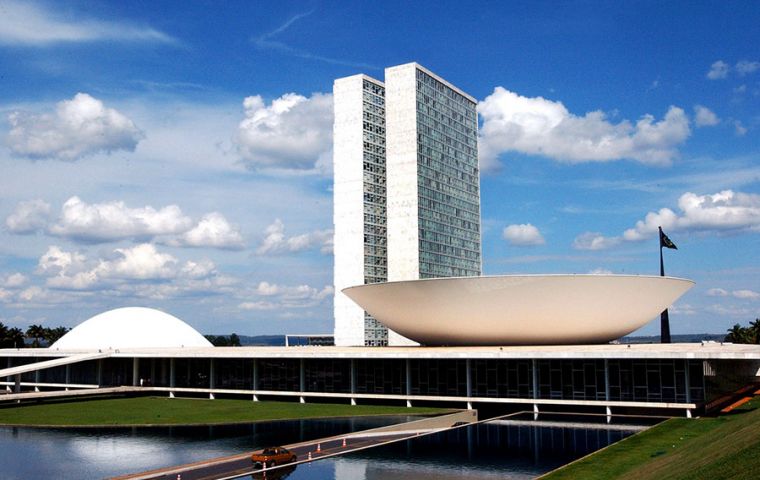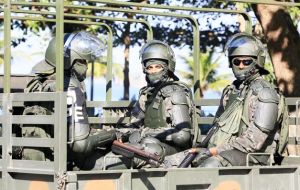MercoPress. South Atlantic News Agency
Brazilian military the most trusted institution, exempt from pensions' reform
 The military has a strong lobby in Congress, the Public Security Parliamentary Front, a group of close to 300 deputies known unofficially as the “bullet caucus”
The military has a strong lobby in Congress, the Public Security Parliamentary Front, a group of close to 300 deputies known unofficially as the “bullet caucus”  Brazilian soldiers in full gear patrolling Rio in anticipation of a possible police strike and street violence
Brazilian soldiers in full gear patrolling Rio in anticipation of a possible police strike and street violence  Deputy Alberto Fraga argues that the military, unlike other professions, has no right to strike or unionize, and does not work to a fixed timetable.
Deputy Alberto Fraga argues that the military, unlike other professions, has no right to strike or unionize, and does not work to a fixed timetable. Ever so dependent on the Armed Forces to keep law and order, the Brazilian government has exempted the military from a far-reaching pension reform. Following Congress's approval of a public spending cap late last year, the government of President Michel Temer is pushing ahead with a broad pension reform as the next stage of its austerity agenda.
The proposal sets a minimum retirement age for the first time, requiring both private and public sector employees to work until the age of 65, compared with the current average age of 55. A vote on the bill is expected in the first half of this year.
The armed forces were included in the original proposal, but were later exempt after growing signs of discontent among their leadership.
Public opinion polls show that the military is the most-trusted public institution in Brazil and roughly one in three citizens favor military intervention to put the country back on track. Authorities say they haven't given up on changes to the military's benefit system but these will come only after Congress passes the main reform bill.
“The government is afraid of the opposition the military could create with a change to their pension rules,” said Raul Velloso, an economist and expert in public finance.
The Defense Ministry forwarded a presentation saying that a 2001 reform of the armed forces' benefits had already led to considerable savings and that it would “not be reasonable to impose further restrictions on the military.” It also said that men and women in uniform earn less than other public servants.
Benefits taking into account the dangers and hardships of an armed forces career are common across the globe, but Brazil bestows particularly generous privileges on its military, according to Paulo Tafner, an economist and pensions' expert. Brazilian military personnel currently retire at an average age of 50, some with a pension equivalent to their final salary, said Tafner.
Those who defend the current system argue that members of the armed forces do not technically retire, but pass into the reserves, and that they could still be called up to serve their country.
According to unpublished Treasury data seen by Bloomberg, Brazil's social security spending on civil servants ran a deficit of 71.8 billion reais (US$22.8 billion) from January to November 2016. The armed forces accounted for 44% of the gap and, on average, paid in less while receiving larger benefits than other public sector workers.
The military has a strong lobby in Congress, including the Public Security Parliamentary Front, a group of close to 300 deputies known unofficially as the “bullet caucus” who advocate a conservative approach to law and order issues. The group's leader, Deputy Alberto Fraga, defends the current benefit system for the armed forces, arguing that the military, unlike other professions, has no right to strike or unionize, and does not work to a fixed timetable. “The current rule is fair,” he said.
But the armed forces' exclusion from the bill currently in Congress has raised questions about what some see as the privileged role of the military in Brazil, 30 years after the return to democracy. The government's plan “puts a huge cost on some while leaving the military untouched,” said Rafael Cortez, a political analyst from the consultancy Tendencias.
During Brazil's recent political and economic upheaval, support for democracy fell from 54% to 32% between 2015 and 2016, according to a Latinobarometro survey published in September.
In November around 100 demonstrators managed to break into Congress and hold a protest demanding the return of military government. The head of the army, General Eduardo Villas Boas, said there was “zero chance” of that happening in an interview with O Estado de S. Paulo on Dec. 10, but he compared the situation to a pressure cooker.
“Sometimes, it is enough for a fool to take a crazy attitude to set off a chain reaction,” he said, adding that changes to soldiers' salaries and pensions could increase the pressure.




Top Comments
Disclaimer & comment rules-

-

-

Read all commentsSometimes, it is enough for a fool to take a crazy attitude to set off a chain reaction
Feb 18th, 2017 - 08:33 pm 0Sometimes its wise to keep the military on side, especially if you intend to use them ?
Which opinion polls?
Feb 19th, 2017 - 02:16 am 0REF: “later exempt after growing signs of discontent among their leadership”: Sounds more like a joke than a “genuine”[?] excuse!
Feb 20th, 2017 - 01:00 pm 0“Discontent”, about WHAT?
Commenting for this story is now closed.
If you have a Facebook account, become a fan and comment on our Facebook Page!